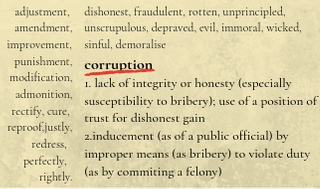What is Political Corruption?
There is no universally accepted definition of political corruption but different international documents, laws and non-governmental integrity organisations provide some idea of what constitutes corrupt conduct or specific acts of corruption.
Transparency International (a leading anti-corruption NGO) describes corruption generally as “the abuse of entrusted power for private gain”. Corruption can be “grand” involving high level government officials which distort policies or the functioning of the state or “petty” which refers to everyday abuse by low-level public officials in their interactions with ordinary citizens, who often are trying to access basic goods or services.
In the international context, the United Nations Convention against Corruption considers the following acts to be corrupt conduct, among others: money laundering (art 14), bribery of public officials (arts 15 and 16), embezzlement, misappropriation or other diversion of property by a public official (art 17), trading in influence (art 18) illicit enrichment and obstruction of justice (art 25).



Developing countries lose between US$20 to US$40 billion each year through bribery, misappropriation of funds, and other corrupt practices … These criminal flows are a drain on social services and economic development programs, contributing to the further impoverishment of the world’s poorest countries. The victims include children in need of education, patients in need of treatment, and all members of society who contribute their fair share and deserve assurance that public funds are being used to improve their lives.
Yury Fedotov, Executive Director of UNODC and Ngozi N. Okonjo-Iweala, Managing Director of the World bank, Preface to Asset Recovery Handbook
 In Australia, the law enforcement division of the proposed Commonwealth Integrity Commission will have the same definition of “corrupt conduct” as found in the Australian Law Enforcement and Integrity Commissioner Act 2006 which broadly includes: “conduct that involves the staff member abusing his or her office; or conduct that perverts, or that is engaged in for the purpose of perverting, the course of justice; or is engaged in for the purpose of, corruption of any other kind” (ALEICA 2006, s 6, “engages in corrupt conduct”). The public sector division of the proposed Commonwealth Integrity Commission will investigate conduct capable of constituting a nominated range of specific criminal offences but will not be able to make findings of corruption at large (A Commonwealth Integrity Commission – proposed reforms Consultation Paper). This arguably does not go far enough to root out political corruption in Australia.
In Australia, the law enforcement division of the proposed Commonwealth Integrity Commission will have the same definition of “corrupt conduct” as found in the Australian Law Enforcement and Integrity Commissioner Act 2006 which broadly includes: “conduct that involves the staff member abusing his or her office; or conduct that perverts, or that is engaged in for the purpose of perverting, the course of justice; or is engaged in for the purpose of, corruption of any other kind” (ALEICA 2006, s 6, “engages in corrupt conduct”). The public sector division of the proposed Commonwealth Integrity Commission will investigate conduct capable of constituting a nominated range of specific criminal offences but will not be able to make findings of corruption at large (A Commonwealth Integrity Commission – proposed reforms Consultation Paper). This arguably does not go far enough to root out political corruption in Australia.
In New South Wales, corrupt conduct, as defined in the Independent Commission Against Corruption Act 1988 (“the ICAC Act”), is deliberate or intentional wrongdoing, not negligence or a mistake. It has to involve or affect a NSW public official or public sector organisation (ICAC website). Some potential examples of corrupt conduct are:
- a public official improperly uses, or tries to improperly use, the knowledge, power or resources of their position for personal gain or the advantage of others
- a public official dishonestly exercises his or her official functions, or in a partial manner breaches public trust or misuses information.
- a local councillor voting in favour of a development in which the councillor has an undisclosed financial interest
- a former public official selling confidential information gained while working in an official capacity.
Consequences of Corruption
Regardless of the form of corruption, it usually has a disproportionately adverse effect on the poor, the weak and the vulnerable of society. Political corruption also threatens political institutions especially democratic ones, weakens state infrastructure especially in developing countries, it unjustly enriches those who engage in corrupt conduct, it can have detrimental effect on the environment in can lead to an increase in both petty and large scale international organised crime (people smuggling, human trafficking and terrorism) and perverts the rule of law.
Corruption is present in all countries, rich and poor, North and South, developed and developing… The World Economic Forum estimates that the cost of corruption is at least $2.6 trillion – or 5 per cent of global gross domestic product Corruption robs schools, hospitals and others of vitally needed funds…It rots institutions, as public officials enrich themselves or turn a blind eye to criminality…It deprives people of their rights, drives away foreign investment and despoils the environment. The poor and vulnerable suffer disproportionately. And impunity compounds the problem.
Antonio Guterres “Secretary General’s Remarks to the Security Council on Corruption in Conflict”, 10 September 2018
Political Corruption in Australia
The best way to stop corruption is to prevent it. While Australia has a relatively low level of corruption, when measured against other countries in the world, corruption is growing within Australia. In 2012 Australia ranked 7th in Transparency International’s Corruptions Perceptions Index but it has progressively been dropping until it hit 13th in 2018. By Contrast New Zealand has consistently been ranked first or second in every year since 2012. Most corruption investigations in Australia focus on “serious and systemic corruption” however, if one can curb corruption in its smaller forms, it will not lead to being “serious or systemic”.
Operation Heritage/Marca was a joint ACLEI investigation which uncovered serious and systemic corruption at the Sydney International Airport. Twenty six individuals were prosecuted for offences relating to the facilitation of border controlled substances through the airport, the disclosure of operational methodology, and accepting bribes.
In Operation MARLOWE an ACLEI investigation into unauthorised disclosure of classified AFP information by an AFP Protective Service Officer observed that the officer had exhibited a history of adverse behaviour. The officer was engaging in regular illicit drug use and associating with people involved in criminal activity.
As with many other clandestine practices political corruption is difficult to uncover. These are only two specific examples of political corruption in Australia but there are more. In a 2017 survey, 5% (one in 20) of respondents in the APS employee census indicated that they had witnessed another employee engaging in behaviour which they considered to be corrupt. The Global Corruption Barometer Survey Results (conducted by Griffith University and Transparency International) found that two thirds (67%) of Australians favour a national integrity commission.
Political Corruption in the International Context
The United Nations Convention against Corruption is the only legally binding universal anti-corruption instrument. 185 countries including Australia are party to it. The Convention covers many different forms of corruption, such as bribery, trading in influence, abuse of functions, and various acts of corruption in the private sector.
Countering corruption contributes to further strengthening all human rights as human rights are better protected in states which have political integrity and transparency. The United Nations Convention against Corruption (UNCAC) recognises principles such integrity, accountability, transparency and the right to information, all of which reinforces the practical application and respect for human rights. Where corruption flourishes with impunity it leads to persistent human rights abuses such as human trafficking and organised crime.
Political corruption is recognised as one of most the important global issues of our time therefore two of the UN’s Sustainable Development Goals are dedicated to reducing it: Substantially reduce corruption and bribery in all their forms (SDG 16.5) and Develop effective, accountable and transparent institutions at all levels (SDG 16.6). The UN recognises that countering corruption contributes to further strengthening democracy and the rule of law. States that have strong, transparent and accountable democratic institutions tend to be more free of corruption.![]()
[Corruption] is an assault on the values of the United Nations. It robs societies of schools, hospitals and other vital services, drives away foreign investment and strips nations of their natural resources. It undermines the rule of law and abets crimes such as the illicit trafficking of people, drugs and arms. Tax evasion, money laundering and other illicit flows divert much-needed resources for sustainable development… Corruption begets more corruption, and fosters a corrosive culture of impunity. The United Nations Convention against Corruption is among our primary tools for advancing the fight. Sustainable Development Goal 16 and its targets also offer a template for action.
Secretary-General’s Message for 2018 on International Anti-Corruption Day (9 December 2018)
- To find out more about what the Church teaches click here.
- For more information and how you can get involved click here.
